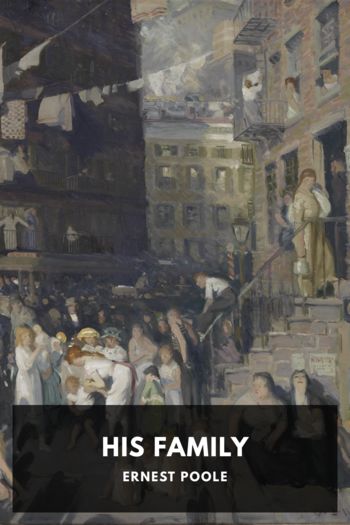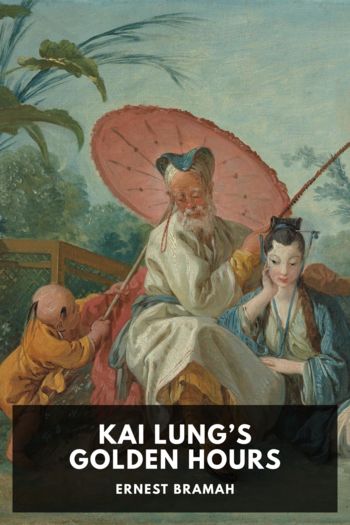His Family - Ernest Poole (ereader for comics .txt) 📗

- Author: Ernest Poole
Book online «His Family - Ernest Poole (ereader for comics .txt) 📗». Author Ernest Poole
But when at last it was over, and Roger had spent the next day in his office, had found it impossible to work and so had gone home early, Deborah came to him in his room.
“Now we must have a talk,” she said. “Allan has gone through Bruce’s affairs, and there are still debts to be settled, it seems.”
“How much do they come to, Deborah?”
“About five thousand dollars,” she said. And for a moment neither spoke. “I wish I could help you out,” she went on, “but I have nothing saved and neither has Allan. We’ve both kept using our money downtown—except just enough for the trip abroad—and we’ll need almost all of that to settle for the funeral.”
“I can manage,” Roger said, and again there was a silence.
“Edith will have to come here to live,” Deborah said presently. Her father’s heavy face grew stern.
“I’d thought of that,” he answered. “But it will be hard on her, Deborah—”
“I know it will—but I don’t see anything else to be done.” The deep quiet voice of his daughter grew sweet with pity as she spoke. “At least we can try to make it a little easier for her. You can take her up to the mountains and I can close her apartment. But of course she won’t agree to it unless she knows how matters stand.” Deborah waited a little. “Don’t you think you’re the best one to tell her?”
“Yes,” said Roger, after a pause.
“Then suppose we go to her. I’m sleeping up there for the next few nights.”
They found Edith in her living room. She had sent the nurse out, put the children to bed, and left alone with nothing to do she had sat facing her first night. Her light soft hair was disheveled, her pretty features pale and set. But the moment Roger entered he saw that she had herself in hand.
“Well, father,” she said steadily. “You’d better tell me about our affairs. My affairs,” she corrected herself. When he had explained, she was silent a moment, and then in a voice harsh, bitter, abrupt, “That will be hard on the children,” she said. On an impulse he started to take her hand, but she drew a little away from him.
“The children, my dear,” he said huskily, “will be taken care of always.”
“Yes.” And again she was silent. “I’ve been thinking I’d like to go up to the mountains—right away,” she continued.
“Just our idea,” he told her. “Deborah will arrange it at once.”
“That’s good of Deborah,” she replied. And after another pause: “But take her home with you—will you? I’d rather not have her here tonight.”
“I think she’d better stay, my dear.”
“All right.” In a tone of weariness. “Madge Deering called me up tonight. She’s coming in town tomorrow, and she means to stay till I go.”
“I’m glad,” he said approvingly. Madge had been a widow for years. Living out in Morristown with four daughters to bring up, she had determinedly fought her way and had not only regained her hold but had even grown in strength and breadth since the death of her husband long ago. “I’m glad,” he said. “You and Madge—” he paused.
“Yes, we’ll have a good deal in common,” Edith finished out his thought. “You look tired, dad. Hadn’t you better go home now?” she suggested after a moment.
“Yes,” said Roger, rising. “Good night, my child. Remember.”
In the outer hallway he found Deborah with Laura. Laura had been here several times. She was getting Edith’s mourning.
“There’s a love of a hat at Thurn’s,” she was saying softly, “if only we can get her to wear it. It’s just her type.” And Laura drew an anxious breath. “Anything,” she added, “to escape that hideous heavy crepe.”
Roger slightly raised his brows. He noticed a faint delicious perfume that irritated him suddenly. But glancing again at his daughter, trim, fresh and so immaculate, the joy of life barely concealed in her eyes, he stopped and talked and smiled at her, as Deborah was doing, enjoying her beauty and her youth, her love and all her happiness. And though they spoke of her sister, she knew they were thinking of herself, and that it was quite right they should, for it gave them a little relief from their gloom. She was honestly sorry for Edith, but she was sorrier still for Bruce, who she knew had always liked her more than he would have cared to say. She was sorrier for Bruce because, while Edith had lost only her husband, Bruce had lost his very life. And life meant so much to Laura, these days, the glowing, coursing, vibrant life of her warm beautiful body. She was thinking of that as she stood in the hall.
In the evening, at home in his study, Roger heard a slight knock at the door. He looked up and saw John.
“May I come in, Mr. Gale, for a minute?”
“Yes, my boy.” John hobbled in.
“Only a minute.” His voice was embarrassed. “Just two or three things I thought of,” he said. “The first was about your son-in-law. You see, I was his stenographer—and while I was in his office—this morning helping Doctor Baird—I found a good deal I can do there still—about things no one remembers but me. So I’ll stay there awhile, if it’s all right. Only—” he paused—“without any pay. See what I mean?”
“Yes, I see,” said Roger. “And you’d better stay—in that way if you like.”
“Thanks,” said John. “Then about his wife and family. You’re to take them up to the mountains, I hear—and—well, before this happened you asked me up this summer. But I guess I’d better not.”
“I don’t think you’d be in the way, my boy.”
“I’d rather stay here, if you don’t mind. When I’m through in your son-in-law’s office I thought





Comments (0)